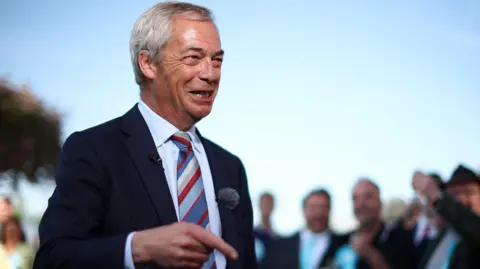In a recent local election that has stirred significant political debate, Nigel Farage, the leader of Reform UK, has celebrated what he calls “unprecedented” gains, reflecting a notable shift in the political landscape of Britain. This local election resulted in Reform UK gaining control of ten local councils, winning two mayoral races, and committing to their first parliamentary seat through a successful bid in the Runcorn and Helsby by-election. Farage boldly claimed this moment as “the end of two-party politics,” signaling a potential reconfiguration of voter preferences away from the historic dominance of Labour and Conservatives.
The fallout from these election results left both the Labour Party and the Conservative Party grappling with their losses. Labour’s leader, Sir Keir Starmer, acknowledged the harsh realities his party faces, admitting that the public does not yet perceive the benefits of Labour’s governance. In a candid moment, he emphasized the need for the party to escalate efforts in providing the positive changes that the electorate is yearning for. Meanwhile, Conservative leader Kemi Badenoch vowed to rebuild her party’s credibility as a viable alternative, expressing determination to restore faith among disillusioned voters.
The election results were particularly disheartening for the Conservative Party, which not only saw significant defections to Reform UK but also lost numerous seats to the Liberal Democrats, a smaller party that has made considerable strides in securing council control across various regions. Following the election, Badenoch conveyed her apologies to the Conservative councillors who had lost their positions, asserting that they were hardworking individuals who did not deserve the electoral drubbing they faced. Furthermore, she attributed the losses to the party’s long tenure in governance, which she claims has drained morale and resources.
Farage’s assertions were met with criticisms from Labour insiders who argue that recent policy decisions, such as cutting winter fuel payments affecting seniors, have alienated potential voters and may have contributed to their electoral defeat. Labour MP Rachael Maskell urged her party to reconsider these cuts in order to foster a fairer distribution of wealth, echoing the sentiments of many constituents who feel left behind.
In a broader context, the election results illustrated not only the current frailty of the main parties but also the emergence of a multi-party system where Reform UK and the Liberal Democrats are gaining ground. The Liberal Democrats emerged as a significant force, regaining 163 seats and successfully wresting control of several councils from the Conservatives, including Shropshire and Oxfordshire. Their leader, Sir Ed Davey, declared that they have risen to become the new “party of Middle England,” thereby redefining their political identity amid this shifting landscape.
Despite their gains, the Green Party also faced challenges, successfully winning 44 seats while grappling with disappointment in high-profile elections such as the West of England mayoral race. Green politicians, like Baroness Jenny Jones, suggested that an era of five-party politics offers greater opportunities as voters start to seek parties that align more closely with their beliefs rather than just aligning with the more traditional choices of Labour and Conservative.
The election marks an intriguing chapter in British politics, indicating not only a potentially significant reconfiguration of local governance across England but also an evolving relationship between the electorate and political parties. As parties reassess their strategies and policies in light of these results, the upcoming period could see major ramifications for political campaigning, with the groundwork being laid for future elections. This could facilitate a deeper dialogue regarding the direction in which the nation should proceed as it navigates its challenges, with parties forced to represent a broader spectrum of views and concerns. As the political landscape evolves, both leaders and voters alike will need to engage in discussions about the pressing issues at hand, from economic policies to local governance structures.



